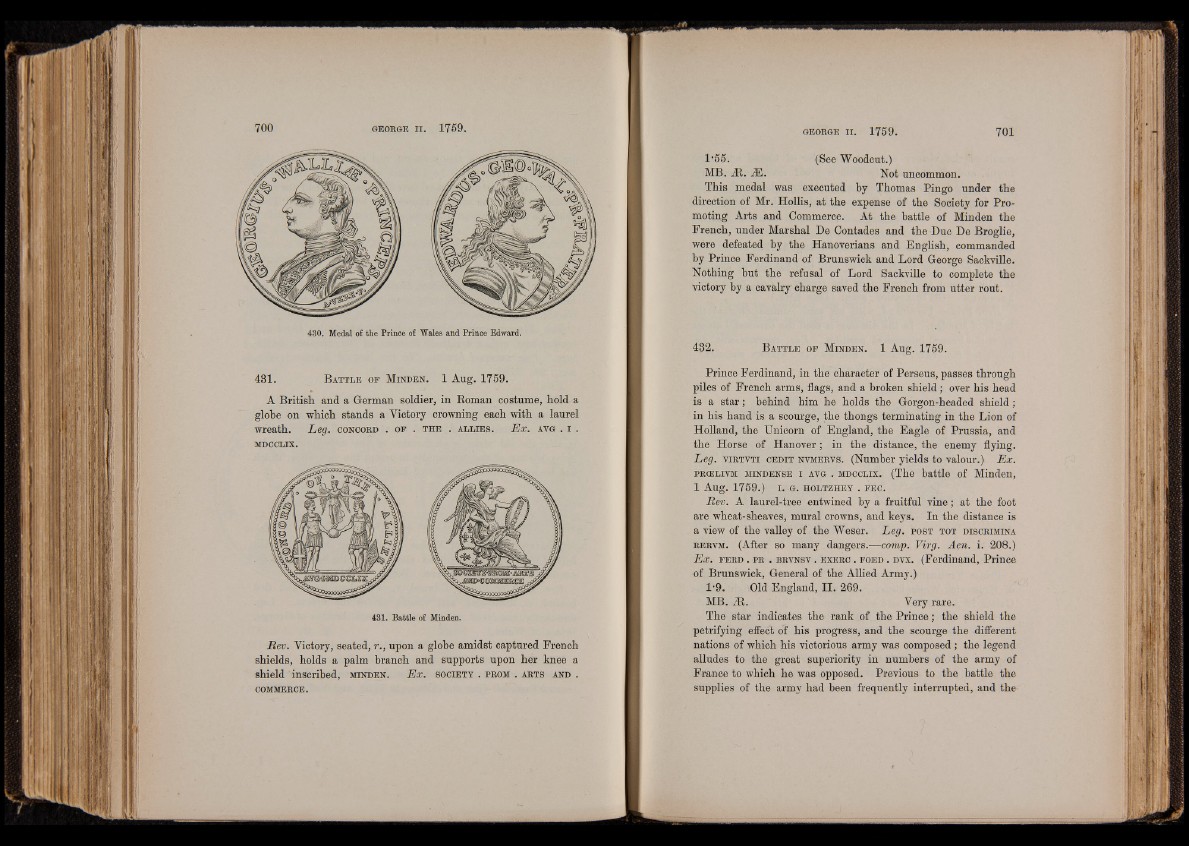
430. Medal of the Prince of Wales and Prince Edward.
431. B attl e of M in d e n . 1 Aug. 1759.
A British and a German soldier, in Roman costume, hold a
globe on which stands a Victory crowning each with a laurel
wreath. Leg. concord . of . t h e . a l l ie s . E x . avg . i .
MDCCLIX.
431. Battle of Minden.
Rev. Victory, seated, r., upon a globe amidst captured French
shields, holds a palm branch and supports upon her knee a
shield inscribed, m ind en . E x . society . prom . arts and .
COMMERCE.
1*55. (See Woodcut.)
MB. At. M. Not uncommon.
This medal was executed by Thomas Pingo under the
direction of Mr. Hollis, at the expense of the Society for Promoting
Arts and Commerce. At the battle of Minden the
French, under Marshal De Contades and the Due De Broglie,
were defeated by the Hanoverians and English, commanded
by Prince Ferdinand of Brunswick and Lord George Sackville.
Nothing but the refusal of Lord Sackville to complete the
victory by a cavalry charge saved the French from utter rout.
432. B a ttl e of M in d e n . 1 Aug. 1759.
Prince Ferdinand, in the character of Perseus, passes through
piles of French arms, flags, and a broken shield; over his head
is a star; behind him he holds the Gorgon-headed shield;
in his hand is a scourge, the thongs terminating in the Lion of
Holland, the Unicorn of England, the Eagle of Prussia, and
the Horse of Hanover; in the distance, the enemy flying.
Leg. v ir tv t i c ed it nvmervs. (Number yields to valour.) Ex.
PRCELFVM mindense i avg . mdcclix. (The battle of Minden,
1 Aug. 1759.) I. G. HOLTZHEY . FEC.
Rev. A laurel-tree entwined by a fruitful vine; at the foot
are wheat-sheaves, mural crowns, and keys. In the distance is
a view of the valley of the Weser. Leg. post tot discrimina
rervm. (After so many dangers.—-comp. Virg. Aen. i. 208.)
Ex. f e e d . PR . brvnsv . exerc . foed . Dvx. (Ferdinand, Prince
of Brunswick, General of the Allied Army.)
1-9. Old England, II. 269.
MB. iR. Very rare.
The star indicates the rank of the Prince; the shield the
petrifying eifect of his progress, and the scourge the different
nations of which his victorious army was composed ; the legend
alludes to the great superiority in numbers of the army of
France to which he was opposed. Previous to the battle the
supplies of the army had been frequently interrupted, and the